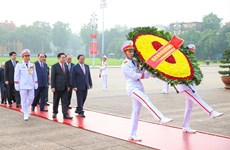Vietnam needs to diversify foreign markets
Expanding export and import markets is considered an urgent need as
the global economy faces unforeseeable changes and the regional and
international political situation remains complicated. Deputy Minister
of Industry and Trade Do Thang Hai spoke with Nhan Dan (People)
newspaper about the issue.
Expanding export and import markets is considered an urgent need as
the global economy faces unforeseeable changes and the regional and
international political situation remains complicated. Deputy Minister
of Industry and Trade Do Thang Hai spoke with Nhan Dan (People)
newspaper about the issue.
*If a country’s imports and exports depend exclusively on the partner state, the country must face risks and instability. Can you tell us about measures that the Ministry of Industry and Trade (MoIT), as a State agency managing import and export activities, has taken to diversify the import and export markets?
The MoIT has implemented various solutions on market development, commercial promotion and international economic integration enhancement.
Firstly, bilateral and multilateral negotiations with major potential markets have been boosted. Vietnam has signed eight free trade agreements, including those with the Association of Southeast Asian Nations, ASEAN+, Chile and Japan. The MoIT is actively negotiating the Trans-Pacific Partnership, the Regional Comprehensive Economic Partnership and free trade agreements with the European Union, the RoK, the European Free Trade Association and the Customs Union of Russia, Belarus and Kazakhstan.
Secondly, export promotion has been enhanced with a focus on developing countries as well as potential and newly arising markets. Beside such traditional markets as China, East Asian and ASEAN member countries, the US and the EU, various activities to study and expand developing markets, including the BRIC nations (Brazil, Russia, India and China), have been undertaken.
Thirdly, the Vietnamese Trade Promotion Agencies around the world have strengthened their activities to help Vietnamese businesses analyse and forecast the situation in the host countries, as well as to understand laws, policies and specific business practices in each market. Meanwhile, businesses are sufficiently informed to take advantage of favourable conditions to access the markets and tax exemptions to boost export and improve the quality of Vietnamese exports to markets with which Vietnam has signed free trade agreements.
Fourthly, favourable conditions have been created for export activities to facilitate trade, encourage promotional events of national products, and to direct and support businesses to protect brand names and labels of exports in foreign markets.
*Have there been any difficulties in implementing these solutions?
The solutions have brought many results, including continually expanded export markets and high export turnover growth rates in major markets. This year, Vietnam is focusing on maintaining exports to such large markets as the US, the EU, Japan, China and ASEAN, while enhancing trade promotion activities in potential new markets in Eastern Europe, Africa, Western Asia and Latin America.
However, efforts to gain access to new markets are facing barriers in the form of protectionist policies in the importing countries. As global economic growth is still instable, protectionism seems to be increasing and many governments take extensive measures to protect their businesses via exchange rate policies, technical measures and antidumping regulations. Vietnamese exporters are also facing increasing competition from other exporters, as the local demand has not risen and the supply from overseas has tended to increase.
In addition, the State budget allocated for national trade promotion, which helps businesses expand and develop markets effectively, remains limited.
*Together with directions given and policies made by relevant agencies and ministries, businesses play a crucial role in expanding export and import markets. What is the MoIT’s evaluation of business capacity and the must-take actions for expanding overseas markets?
Businesses have made important contributions to bringing Vietnamese goods to the world market, increasing the export turnover, and expanding the country’s foreign currency reserves. However, the competitiveness of Vietnamese exports is still low, as the improvement of quality and design has not met the requirements of markets and consumers. Businesses have also met with difficulties in constructing and developing brands, so many exports with large volume have not yet been able to command global market prices. Notably, Vietnamese exports still have limited access to markets with strict quality and food safety requirements.
In addition, many exporters have not understood or paid enough attention to tax priorities, which results in losing interests in tax and competitiveness on the world market. Shortcomings are also seen in their limited changes in the restructuring of investment and production and their insufficient investment in support industries to meet the requirements of certificates of origin.
To reach targets on imports and exports, businesses should strive further to actively grasp opportunities and improve technology and product quality while promoting market expansion.
Joining free trade agreements and opening the market means that businesses have to compete at home, so they should diminish the thought of protection; focus on improving trade models, product quality and value; establish links from production to distribution to consumption and export; all while forming supply chains to create a strong foothold in the global and international value chains.
Businesses should also work closely with State management agencies to reflect promptly arising matters to seek solutions and contribute to boosting export and improving export efficiency.-VNA
*If a country’s imports and exports depend exclusively on the partner state, the country must face risks and instability. Can you tell us about measures that the Ministry of Industry and Trade (MoIT), as a State agency managing import and export activities, has taken to diversify the import and export markets?
The MoIT has implemented various solutions on market development, commercial promotion and international economic integration enhancement.
Firstly, bilateral and multilateral negotiations with major potential markets have been boosted. Vietnam has signed eight free trade agreements, including those with the Association of Southeast Asian Nations, ASEAN+, Chile and Japan. The MoIT is actively negotiating the Trans-Pacific Partnership, the Regional Comprehensive Economic Partnership and free trade agreements with the European Union, the RoK, the European Free Trade Association and the Customs Union of Russia, Belarus and Kazakhstan.
Secondly, export promotion has been enhanced with a focus on developing countries as well as potential and newly arising markets. Beside such traditional markets as China, East Asian and ASEAN member countries, the US and the EU, various activities to study and expand developing markets, including the BRIC nations (Brazil, Russia, India and China), have been undertaken.
Thirdly, the Vietnamese Trade Promotion Agencies around the world have strengthened their activities to help Vietnamese businesses analyse and forecast the situation in the host countries, as well as to understand laws, policies and specific business practices in each market. Meanwhile, businesses are sufficiently informed to take advantage of favourable conditions to access the markets and tax exemptions to boost export and improve the quality of Vietnamese exports to markets with which Vietnam has signed free trade agreements.
Fourthly, favourable conditions have been created for export activities to facilitate trade, encourage promotional events of national products, and to direct and support businesses to protect brand names and labels of exports in foreign markets.
*Have there been any difficulties in implementing these solutions?
The solutions have brought many results, including continually expanded export markets and high export turnover growth rates in major markets. This year, Vietnam is focusing on maintaining exports to such large markets as the US, the EU, Japan, China and ASEAN, while enhancing trade promotion activities in potential new markets in Eastern Europe, Africa, Western Asia and Latin America.
However, efforts to gain access to new markets are facing barriers in the form of protectionist policies in the importing countries. As global economic growth is still instable, protectionism seems to be increasing and many governments take extensive measures to protect their businesses via exchange rate policies, technical measures and antidumping regulations. Vietnamese exporters are also facing increasing competition from other exporters, as the local demand has not risen and the supply from overseas has tended to increase.
In addition, the State budget allocated for national trade promotion, which helps businesses expand and develop markets effectively, remains limited.
*Together with directions given and policies made by relevant agencies and ministries, businesses play a crucial role in expanding export and import markets. What is the MoIT’s evaluation of business capacity and the must-take actions for expanding overseas markets?
Businesses have made important contributions to bringing Vietnamese goods to the world market, increasing the export turnover, and expanding the country’s foreign currency reserves. However, the competitiveness of Vietnamese exports is still low, as the improvement of quality and design has not met the requirements of markets and consumers. Businesses have also met with difficulties in constructing and developing brands, so many exports with large volume have not yet been able to command global market prices. Notably, Vietnamese exports still have limited access to markets with strict quality and food safety requirements.
In addition, many exporters have not understood or paid enough attention to tax priorities, which results in losing interests in tax and competitiveness on the world market. Shortcomings are also seen in their limited changes in the restructuring of investment and production and their insufficient investment in support industries to meet the requirements of certificates of origin.
To reach targets on imports and exports, businesses should strive further to actively grasp opportunities and improve technology and product quality while promoting market expansion.
Joining free trade agreements and opening the market means that businesses have to compete at home, so they should diminish the thought of protection; focus on improving trade models, product quality and value; establish links from production to distribution to consumption and export; all while forming supply chains to create a strong foothold in the global and international value chains.
Businesses should also work closely with State management agencies to reflect promptly arising matters to seek solutions and contribute to boosting export and improving export efficiency.-VNA












